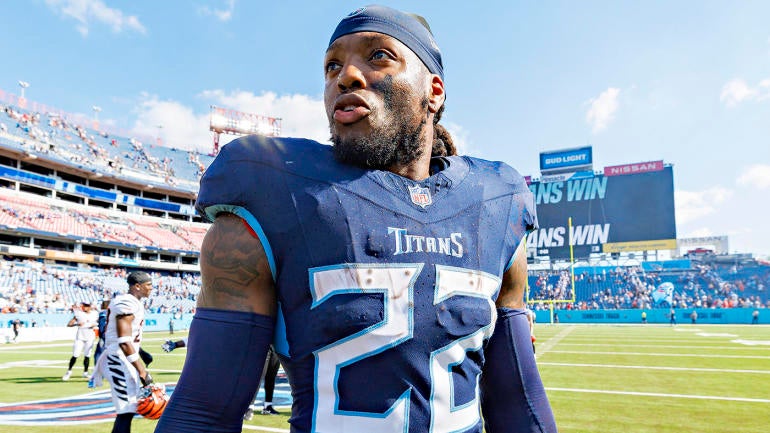
The NFL trade deadline is quickly approaching. Teams have until 4 p.m. ET on Oct. 31 to make trades. Once this deadline passes, trades can't be executed again until the 2024 league year begins on March 13.
If last year is any indication, expect a flurry of activity after the bulk of Week 8's games are played on Sunday, Oct. 29. A record 10 trades were made on the final day of the trading period in 2022.
The Eagles and Titans have gotten the ball rolling early. Two-time first team All-Pro Bowl safety Kevin Byard was acquired by Philadelphia from Tennessee for safety Terrell Edmunds, a 2024 fifth-round pick and a 2024 sixth-round pick this week.
Titans emerging as sellers at deadline; Henry available?
Dealing Byard suggests that the Titans could be sellers at the trade deadline, particularly with a loss to the Falcons on Sunday. The Titans are currently bringing up the rear in the AFC South with a 2-4 record. Dating back to Week 12 of the 2022 season, the Titans have lost 11 of their last 13 games.
It wouldn't be surprising for the Titans to explore trading running back Derrick Henry. The two-time rushing champion is in the final year of a four-year, $50 million contract (worth up to $51 million through incentives).
The Buccaneers, who are contending in a weak NFC South with a 3-3 record, could make sense for Henry. He would provide a boost to an anemic rushing attack. The Buccaneers rank 29th and 31st respectively in the NFL with 77.8 rushing yards per game and their 3.1 yards-per-carry average.
How Bucs, Titans can make Henry trade work
A stumbling block could be how trades work financially in the NFL. The acquiring team must have enough salary cap room to absorb the remainder of the player's current salary in order to make a trade. With a trade occurring after Week 8's games, the acquiring team would be responsible for 10/18ths of a player's 2023 base salary and any other applicable salary components in his contract. Once the player is acquired, the new team can renegotiate or restructure his contract to decrease his cap number and/or salary.
Henry is making $10.5 million, all base salary, during the 2023 season. The remainder of his base salary after Week 8 is $5,833,333. Henry also has a $500,000 incentive for 1,300 or more rushing yards that's classified as likely to be earned because he had 1,538 yards on the ground last season. The total cap room needed to acquire Henry because of this incentive is $6,333,333. The Buccaneers have just over $3.501 million of 2023 cap space, according to NFLPA data. There's about a $2.833 million difference between the two figures.
The Buccaneers will need to trade or release players or restructure contracts to acquire Henry. The best restructure candidate is wide receiver Mike Evans because his $23,699,385 cap number is easily the largest on the team. There are already 2024 through 2026 contract years automatically voiding on the last day of the 2023 league year, which is next March 13, from previous restructures of Evans' contract.
Evans has a $13 million base salary this season. He will have earned $5,777,778 (or 8/18ths) of his 2023 salary after Thursday night's game against the Bills. There will be $7,222,222 left for him to earn. Buccaneers would use their discretionary right to convert a portion of Evans' base salary into signing bonus, which was built into his contract. Most lucrative contracts around the league contain a clause similar to this one.
How Bucs could create needed cap space
For instance, the Buccaneers could create $4.5 million of immediate cap space by converting $6 million of the remaining $7,222,222 in base salary into signing bonus. Evans would be making a combined $7 million in base salary after reworking his contract. The $6 million would be prorated at $1.5 million annually from 2023 through 2026. Evans' 2023 cap number would go from $23,699,385 to $19,199,385 in the process.
The Buccaneers wouldn't have an issue accommodating Henry's contract after the restructure. There would be slightly over $8 million of cap space prior to the trade, leaving Tampa Bay with a little more than $1.665 million of room to spare once Henry was on the roster.
The Buccaneers might not find an Evans restructure appealing because there is already going to be $12.198 million of dead money -- a salary cap charge for a player no longer on the roster -- in 2024 when his contract expires next March. Restructuring would increase the 2024 dead money to $16.698 million.
Teams aren't allowed to include cash or cap room in trades under NFL rules. The way around it is for the team and player to restructure the contract before the trade by converting salary into signing bonus. It operates essentially the same way as including cash or cap room because the acquiring team's cap hit for the player in the current league year is reduced.
This type of maneuver is becoming increasingly common in trades at the deadline when an acquiring team has a tight salary cap. One of the first instances was when the Jaguars dealt offensive tackle Eugene Monroe to the Ravens in 2013 a couple of weeks before the trade deadline.
Henry restructuring an option for Titans
Eating salary in this manner could be a way for the Titans to increase the draft pick compensation received for Henry. That's what the Broncos did in 2021 when edge rusher Von Miller was dealt to the Rams at the trade deadline. Since the Rams weren't in a position with the salary cap to absorb the Super Bowl 50 MVP's remaining $9,722,222 2021 base salary, the Broncos converted $9 million into signing bonus prior to the trade. The Rams only had a $722,222 salary cap charge to acquire Miller, who was in a contract year. Denver got 2022 second- and third-round picks for Miller. The trade paid huge dividends for the Rams as Miller gave the pass rush a shot in the arm en route to winning Super Bowl LVI.
Here's an example of how this concept would work with Henry. Just like the Buccaneers with Evans, the Titans have automatic salary conversion rights in Henry's contract. If $4.5 million of Henry's remaining $5,833,333 is converted to signing bonus, the Buccaneers would only be responsible for $1,333,333 in salary plus the $500,000 cap charge for the rushing incentive. This could easily be accommodated by the Buccaneers given their cap situation.
The Titans would pick up $4,833,333 of 2023 cap space from dealing Henry, thanks to losing his remaining base salary, the incentive and the signing bonus being prorated through 2025 at $1.5 million annually because voiding 2024 and 2025 contract years were added during a 2022 contract restructure. Henry's 2023 cap charge would go from $16,370,007 to $11,536,674 with the transaction.
There was going to be $4,735,294 in 2024 dead money when Henry's contract expired after the season because of the restructure. It would increase to $7,735,294 with the additional $3 million in proration associated with 2024 and 2025 due to the pre-trade salary conversion.
Another option would be for Tennessee to get Henry off the books after this year in a trade. This would entail the two voiding years being deleted in the salary conversion so the $4,735,294 would accelerate into 2023. Without the additional years for proration the entire new $4.5 million signing bonus would be a 2023 cap obligation. The net effect would be the Titans losing $2,901,961 of 2023 cap room because the $1,833,333 of 2023 cap charges Tampa Bay would be taking on wouldn't cover the $4,735,294 in proration from the deleted years.
There will be economic challenges in trading Henry to team that doesn't have at least $6,333,333 of cap room. That won't be a problem for the Browns should they choose to try to find a workhorse running back to replace Nick Chubb, who suffered a gruesome season ending knee injury in Week 2's game against the Steelers. The Browns are second in the NFL with just over $34.4 million in cap space.





















